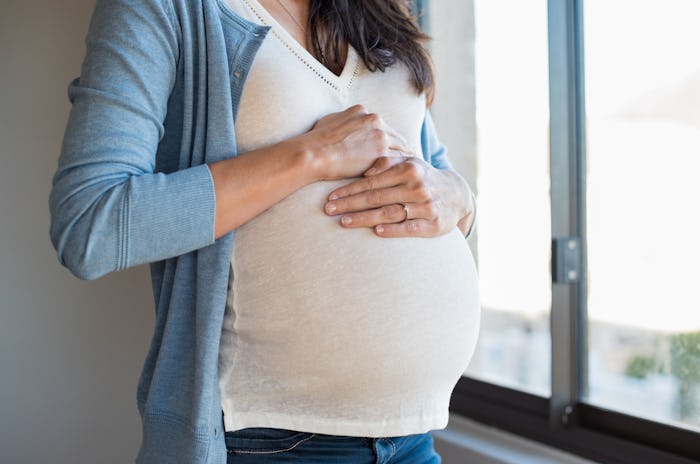Life

Everything You Need To Know About Preeclampsia's Impact On Your Baby
Preeclampsia is a terrifying, life-threatening condition that affects an estimated 2 to 8 percent of all pregnancies in the Unites States each year. Just the mention of preeclampsia sends fear down any mother's spine, and those who have had it know just how dangerous it can be. But what happens to your baby if you have preeclampsia? Are they at risk for complications, too?
Preeclampsia is a form of hypertension that develops during pregnancy, accompanied by elevated levels of protein in the urine, according to the Mayo Clinic. It's assumed to originate in the placenta, when the blood vessels develop improperly or don't function well. Along with the high blood pressure and protein in the urine, women with preeclampsia might also develop headaches, vision problems, nausea and vomiting, upper abdominal and chest pain, impaired liver function, shortness of breath, and may not need to urinate as frequently as they did previously.
It's a scary disease that can possibly lead to the death of both mother and fetus if it goes untreated. According to the Agency for Healthcare Research and Quality, approximately 9 percent of all maternal deaths are directly related to preeclampsia and its more advanced form — eclampsia — which is preeclampsia wherein the mother also suffers seizures. These staggering statistics are why it's paramount that women be screened early and often for the signs and symptoms of preeclampsia.
With all this care and worry about the mother's health, it's easy to forget what happens to your baby if you have preeclampsia. While the mother is the chief concern of any OB-GYN, if you're a pregnant mother looking down the barrel of the dangerous condition, you're definitely worried about your little one being harmed by something that is so completely out of your control. It would be terrifying or maddening for any mother. While I never had preeclampsia, I had anemia severely enough that it was a danger to my child, and I remember with perfect clarity the sense of terror I felt as I was diagnosed and told of the risks and dangers. It's a feeling of being completely outside of yourself, looking in, and yet, you've never been more aware of your body.
I spoke to perinatologist Dr. James Diamond of Ottawa to find out what the risks are, and if they may be mitigated in any way. He tells Romper, "Unfortunately, preeclampsia is a real danger to baby, and it's not always immediate or apparent what those dangers are. We know that many fetuses aren't receiving enough blood flow or adequate oxygen, and that can lead to problems immediately and also have lasting effects."
He adds that many babies born to mothers with preeclampsia will have a lower birth rate, or they're born early. "It's a delicate balance. We don't want them delivered too early, but we also don't want them to be deprived. The risk of stillbirth is there as well, always looming in the background as the treatment plan is developed for the mother."
Diamond says that the risks of blood and oxygen deprivation go beyond low birth weight and preterm birth, too. Those babies could develop developmental or physical disorders, and there are studies that show that babies born to mothers with preeclampsia are more likely to develop coronary artery disease or hypertension in adulthood. "The main factor that is the biggest determinant in fetal outcome is when the preeclampsia develops. If the baby is already at term, we can deliver him or her right away, and treat the mother more easily. It's when it develops earlier in the pregnancy that we really start to worry about fetal morbidity." He notes that in cases of severe preeclampsia, like HELLP syndrome, the outcomes can be even more worrisome. HELLP stands for haemolysis, elevated Liver enzymes, and low platelet count, and accounts for 5 to 12 percent of all patients with preeclampsia.
While it's easy to be fearful, it's also important to keep an open mind. Diamond says that the most important thing is for women to have a line of communication with their doctor so that if any symptoms pop up that might be related to preeclampsia, they can evaluate and treat it. He says that it's always something OB-GYNs will consider during any pregnancy, as it can happen with anyone, so be open and be aware. Your healthcare provider will do everything they can to make sure both you and your baby are safe.
Check out Romper's new video series, Romper's Doula Diaries:
Check out the entire Romper's Doula Diaries series and other videos on Facebook and the Bustle app across Apple TV, Roku, and Amazon Fire TV.
This article was originally published on